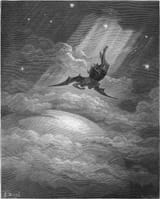Search Results
7/12/2025, 3:20:23 AM
II (ended)
The above idea is thwarted almost immediately. Stephen accompanies his father on an overnight train to Cork, where they will sell an estate belonging to dad. While in town dad gets very wistful about old memories of the town, and some of the old locals remember him and banter him just a bit, all in good fun. Stephen is in his sullen aloof teenager mode and doesn't really feel like any of these other people, not inwardly. The estate is sold, and a short time later Stephen's skill with writing is beginning to produce tangible rewards: he has won literary/essay prizes adding up to, if I am reading it properly, 33 pounds, nothing to sneeze at in those days. For a brief spell he splurges it on his family and himself, and the money quickly evaporates. Toward the end he is pining for (the) girl again, and a woman approaches him on the street (seemingly a prostitute) and makes a man of him. But was it just there? He also thinks of past "lusts", "orgies" etc, but these may be purely mental processes (or possibly masturbation).
III
The big themes here are teenage lust and (the deeply unfortunate and regrettable) full socialization into catholicism. Stephen walks the streets, knows the details, and the whole nonsense of his education which has been pounded into his brain worries his own brain. The chapter does a clever trick: Stephen goes off into this private mental process, worrying about various theological things, god, damnation, all that, but it isn't actually a priest talking in dialogue: it's his own mind, that stream of consciousness modernism stuff. A short time later, now it IS a priest talking, continuing same subject matter, in DIALOGUE, and here we get the famous and very detailed description of the torments of hell, which occurs right at the halfway point of the book. Around here is also the story of the devil's "Non Serviam" which instantly gets him booted out of heaven, something which is explicitly cited in the rather silly but well-known Scorsese film The Departed. Anyway, Stephen is worried for his soul, and he seeks out a church to confess his whoremongering sins. He feels much better. He has been duped. Importantly, we get one line which gives his age and also a sense of timing up to this point: at this point, he is sixteen.
"Give me the boy until he is seven years old and he is mine for life."
The above idea is thwarted almost immediately. Stephen accompanies his father on an overnight train to Cork, where they will sell an estate belonging to dad. While in town dad gets very wistful about old memories of the town, and some of the old locals remember him and banter him just a bit, all in good fun. Stephen is in his sullen aloof teenager mode and doesn't really feel like any of these other people, not inwardly. The estate is sold, and a short time later Stephen's skill with writing is beginning to produce tangible rewards: he has won literary/essay prizes adding up to, if I am reading it properly, 33 pounds, nothing to sneeze at in those days. For a brief spell he splurges it on his family and himself, and the money quickly evaporates. Toward the end he is pining for (the) girl again, and a woman approaches him on the street (seemingly a prostitute) and makes a man of him. But was it just there? He also thinks of past "lusts", "orgies" etc, but these may be purely mental processes (or possibly masturbation).
III
The big themes here are teenage lust and (the deeply unfortunate and regrettable) full socialization into catholicism. Stephen walks the streets, knows the details, and the whole nonsense of his education which has been pounded into his brain worries his own brain. The chapter does a clever trick: Stephen goes off into this private mental process, worrying about various theological things, god, damnation, all that, but it isn't actually a priest talking in dialogue: it's his own mind, that stream of consciousness modernism stuff. A short time later, now it IS a priest talking, continuing same subject matter, in DIALOGUE, and here we get the famous and very detailed description of the torments of hell, which occurs right at the halfway point of the book. Around here is also the story of the devil's "Non Serviam" which instantly gets him booted out of heaven, something which is explicitly cited in the rather silly but well-known Scorsese film The Departed. Anyway, Stephen is worried for his soul, and he seeks out a church to confess his whoremongering sins. He feels much better. He has been duped. Importantly, we get one line which gives his age and also a sense of timing up to this point: at this point, he is sixteen.
"Give me the boy until he is seven years old and he is mine for life."
Page 1
